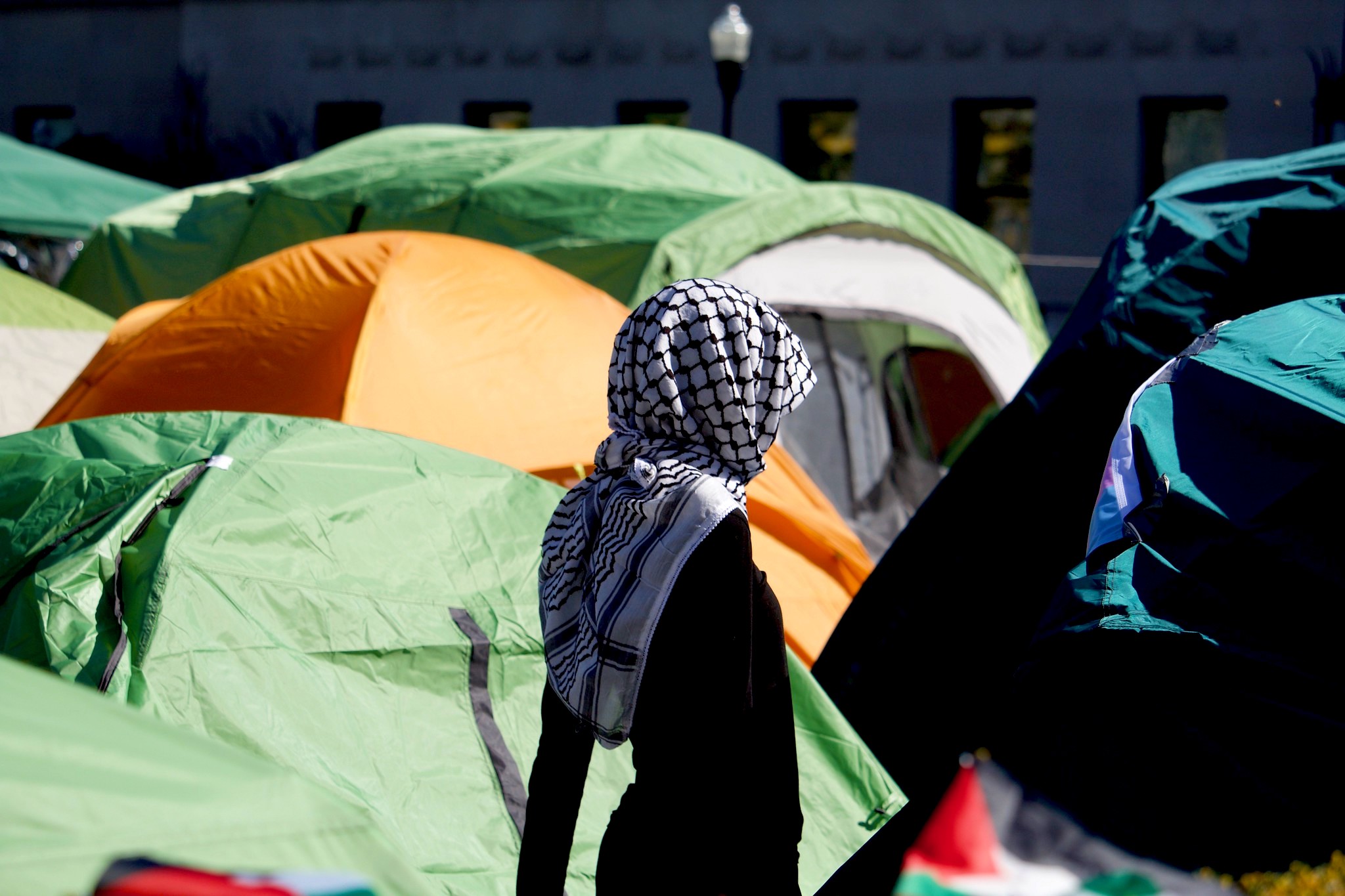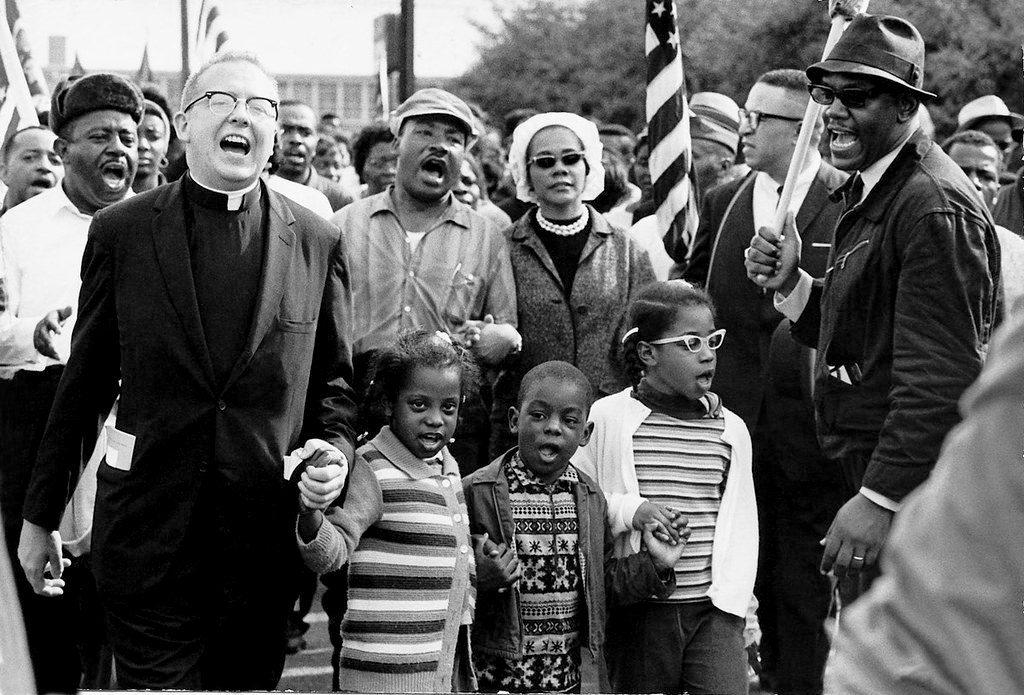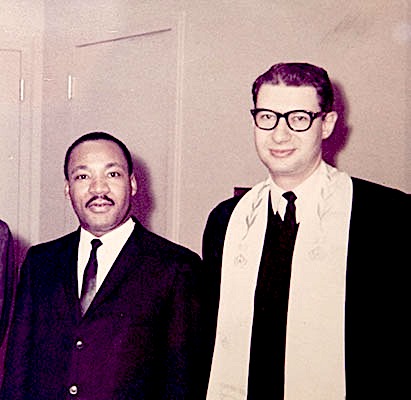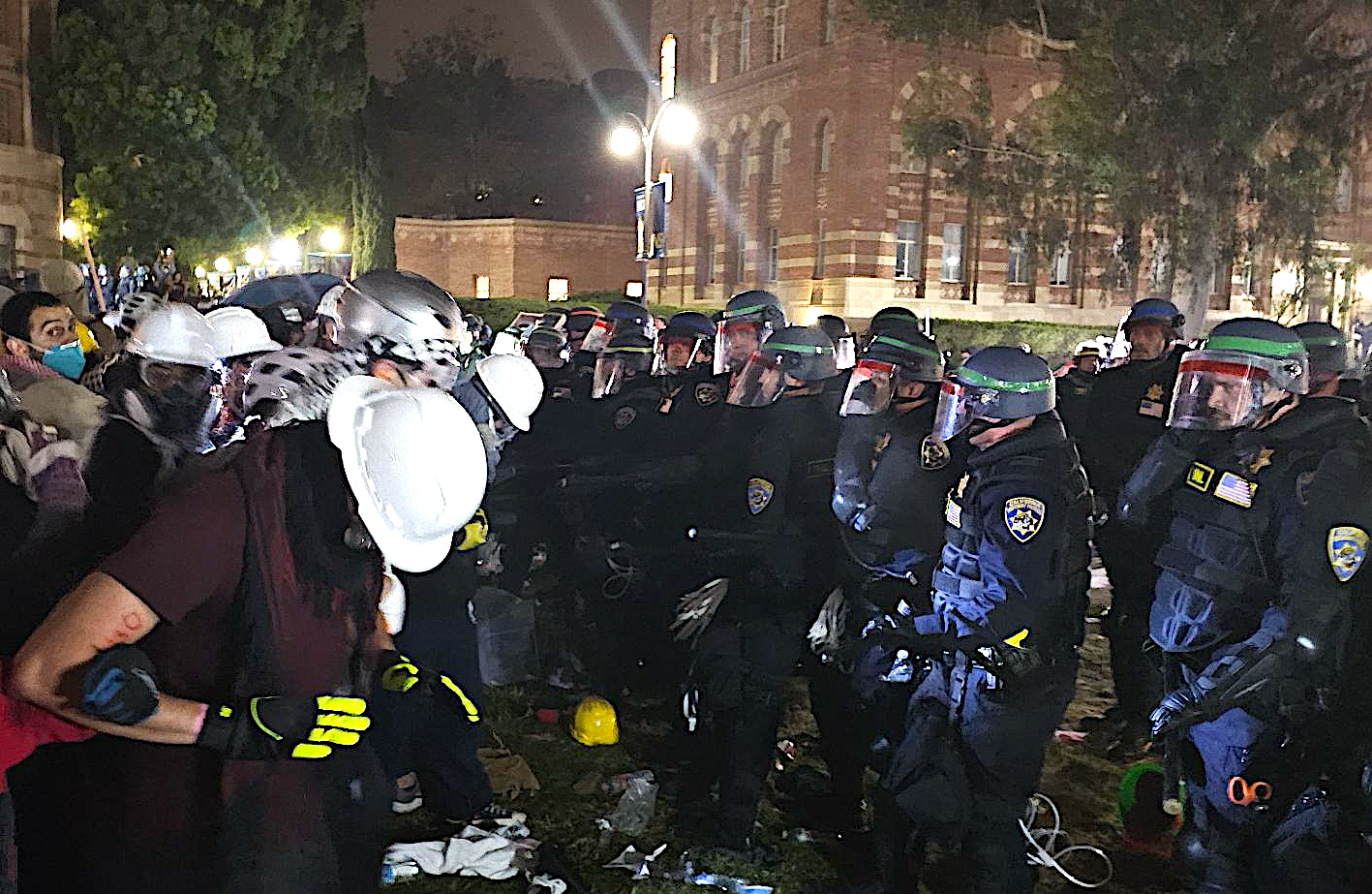Lawrence Davidson responds to a recent commentary in The New York Times by two heirs of the Black-Jewish alliance of the 1960s.

Pro-Palestine student encampment at Columbia University in New York on April 23. (Pamela Drew, Flickr, CC BY-NC 2.0)
By Lawrence Davidson
TothePointAnalysis.com
 In the early 2000s, I was a member of a group called Academics for Israeli-Palestinian Peace. The group went often to the Middle East, visiting most of the countries of that region.
In the early 2000s, I was a member of a group called Academics for Israeli-Palestinian Peace. The group went often to the Middle East, visiting most of the countries of that region.
We repeatedly traveled to Israel and the Palestinian Territories. We interviewed both leaders and ordinary folks. When we would return to the U.S., I would seek out venues to report on our findings — which could be critical of Israel.
I spoke at academic institutions, civic organizations, and to religious groups. However there were always two groups which kept me away from their members:
Most synagogues — It was easy enough to explain this. Most organized Jewish institutions are partisan. They were and mostly still are, dedicated to the dream of a Jewish state functioning as a safe haven in an anti-Semitic world.
The downside of racism felt toward, and oppressive policies applied against, the Palestinians were realities they chose not to deal with. Even today, in the midst of overwhelming evidence of Israel’s failure to preserve either Jewish lives or Jewish ethics, most synagogues will not allow anti-Zionists to speak, even if they are Jewish.
The other group, Black churches, was at first harder to comprehend. During the struggle for racial justice in the U.S., culminating with the civil rights legislation of 1964-1965, there was an alliance between American Jewish and Black organizations.
That alliance was not as smooth and solid as it is popularly believed, but it was real in the sense that you had two groups who saw something to be gained by supporting each other. Black American success in the mid 1960s actually loosened the alliance because it created the space for a Black reassessment of Zionism.
However, that reassessment did not reach those Black Americans who were religiously motivated to identify with a biblically imagined picture of Jewish history. Or, as the authors we are about to analyze put it, “our shared history of slavery and oppression and our common biblical commitment to the prophetic traditions of justice and equality.”
Where this problematic picture held sway, someone speaking out against Zionism was, in my experience, not welcome.
Faith in Dialogue
It was with this background in mind that I read the June 9 New York Times (NYT) opinion piece entitled “Our Fathers Marched With King. Here’s What They Would Say to Activists Today.”
This piece was written by the adult children of two of the civil rights leaders of the 1960s: one Black, Donzaleigh Abernathy, the daughter of the Reverend Ralph Abernathy and the other Jewish, Avi Dresner, the son of Rabbi Israel Dresner. Because their point of view is so different from mine on this issue, I am going to lay out and analyze their message.

Donzaleigh Abernathy in striped sweater, with her brother and sister, in front of Martin Luther King and Coretta Scott King during the 1965 civil rights march from Selma to Montgomery, Alabama; minister holding Donzaleigh’s hand unidentified. (Abernathy Family via National Park Service, GPA Photo Archive, Flickr, Public domain)
The authors begin by affirming the close friendship of their fathers and there is no reason to doubt the assertion that Ralph Abernathy and Israel Dresner were good friends and close associates, both dedicated to the struggle for racial justice in the 1960s. Nor should we doubt the assertion that both men would be “dismayed over the continued erosion of the Black-Jewish Alliance.”
The authors continue by stating that “we believe the lessons of our fathers’ life and work — and, most importantly, the ways in which they bridged the divides between their communities — offer us a path toward navigating our own divisive era.”
What is the principal lesson? “Our fathers fervently believed that it is always the right time to engage in dialogue in the pursuit of understanding and peace.”
Two points immediately come to my mind.
No. 1) The accomplishments of the civil rights movement of the 1950s and 1960s were not a product of dialogue with opponents. They were the product of confrontation and political alliances.
No. 2) Given that it is the behavior of campus protesters that has drawn the authors’ concern, it should be pointed out that dialogue was exactly what most protesters were seeking. The demonstrating students wanted to talk to their college administrators and boards of trustees about their institutional support of a genocidal state. In all but a few cases it was the administrators and trustees who were uninterested in dialogue. It was easier for them to bring in the police. The authors inexplicably miss both of these points.
They also seem to have missed the fact that they live in different times from that of their fathers. In the 1960s, the leaders of mainstream Jewish organizations in the U.S. were aware that their interests involved progress toward a society that protected the civil rights of minorities. That is no longer true of today’s leaders of many of these same organizations. They are no longer interested in the security of minorities. Their interest today is in supporting what they see as the security of Israel. As a result, these organizations — the ones remembered so fondly by Abernathy and Dresner — steadfastly support the slaughter going on in the Gaza Strip. Do our author’s understand this?

Rabbi Dresner, right, with Rev. Martin Luther King Jr. in undated photo. (Wikimedia Commons, CC BY 4.0)
There may not be any way of “getting to yes” through dialogue with such people. Such doubt in the efficacy of dialogue seems to be suggested by the talks carried on during the so-called peace process. This multiyear negotiation may well have been dragged out by the Israelis as cover for their relentless territorial ambitions. Have our authors considered this possibility?
Biblical Values, Racism & the Holocaust
Then there is the authors’ appeal to a shared biblical vision between Blacks and Jews. For instance,
“our fathers saw much in common. [M.L.] King, Abernathy and their fellow Black activists found inspiration in the Exodus story.”
However, the way many Israeli Jews remember the aftermath of the Exodus story is with admiration for the Israelite slaughter of the “Amalekites” — performed under God’s direct order. This seems to be Prime Minister Benjamin Netanyahu’s model for contemporary “prophetic Justice.” Have our authors noted this?
Netanyahu declaring invasion: "You must remember what Amalek has done to you, says our Holy Bible"
1 Samuel 15:3
"Now go and smite Amalek, and utterly destroy all that they have, and spare them not; but slay both man and woman, infant and suckling, ox and sheep, camel and ass" pic.twitter.com/5QF9PkGhjJ
— Michael Tracey (@mtracey) October 28, 2023
Perhaps more relevant is the issue of the Holocaust and its role as a “cautionary tale.” The authors accurately note that the Holocaust led their fathers to stand against all forms of racism. It was on this basis that they quote Reverend Abernathy as saying
“In the fight against discrimination, Black Americans and American Jews have shared profound and enduring common interests that far transcend any differences between us.”
Yet the Jewish-Black alliance did not last. And a major reason why this is so, is also one that the authors chose not to recognize. They do not grasp the fact that Zionism is just such a form of racism that casts aside that cautionary tale of genocidal racism. Seven decades (counting from 1948) of violent Israeli oppression against Palestinians has generated a range of reactions, and the non-violent one, based on a faith in dialogue (that “peace process”), has been tried and found wanting.
Over time, the Palestinians have been pushed into corners, both territorially and psychologically, and this has led to push back that is indeed violent — and also most accurately described as self-defense.
Despite this overall history, indeed despite the specific history of the Gaza blockade, Abernathy’s daughter and Dresner’s son claimed to have been “shocked” by the Palestinian resistance action (it involved more than just Hamas) of Oct. 7.
And they almost immediately interpreted the pro-Palestinian protests held in reaction to Israel’s genocidal revenge this way,
“… within hours after the attack, onlookers [protesters] immediately turned in a newly dark direction: with an explosion of antisemitism, a celebration, at certain protests, of the Hamas attack.”
The truth is that the protesters were, and largely continue to be, the only ones to put the Oct. 7 action in proper historical context. They recognized that the action was not unprovoked. Abernathy and Dresner certainly fail to do so.
Unable to accurately interpret what is going on, the two heirs of the Black-Jewish alliance of the 1960s, go on to suggest their answer to what happened on the college campuses following Oct 7:
“We want to bring our fathers’ much-needed messages and methods of love and unity to campuses experiencing turmoil.”
In other words, these two believe that “the message of love and unity,” preached 50 years ago by Black and Jewish Americans in relation to U.S. racial problems, will solve an inherently colonialist Middle Eastern problem. What Denser and Abernathy themselves have ignored, and this bears repeating, is the fact that:
No. 1) their tactical message, as applied to the decades long plight of the Palestinians, has already proved wholly ineffective and
No. 2) the protesters did not cause the campus “turmoil” — the campus authorities, influenced by Zionist donors, did so. And, these administrators and donors are the people not interested in dialogue.
Nonetheless, Abernathy and Dresner believe that they simply have to “tell the story of our shared history and use it as a bridge to a better future …. We want to bring together Zionist and pro-Palestinian protesters to find common ground.” They promise to make the rounds of colleges and universities this fall to preach to the multitude.
Faith Is Not Enough

The LAPD clashing with pro-Palestine student protesters at the UCLA encampment on May 1. (Media shared by people at the UCLA protest and encampment, Wikimedia Commons, CC BY 4.0)
Non-violence is simply not a workable response to every situation. If non-violence was such a universal answer then, given the number of times it has been pushed forward as a cure, the lion would have long ago laid down with the lamb.
We still tend to exaggerate the achievements of those who appear to have gained victory through non-violence. For instance, in the cases of Mahatma Gandhi, Nelson Mandela and Martin Luther King, their non-violent message existed side-by-side with other groups fighting for the same goals and using more aggressive tactics. In particular, religiously inspired pacifists have a hard time admitting this fact.
And that is probably who our authors are. Abernathy is almost certainly driven by the faith of her father. Dresner may well be driven by such faith intermixed with the political ideology of Zionism (now masquerading as Judaism itself).
Be that as it may, we are brought to a final point. The non-violent message, allegedly made powerful through the miracle of endless dialogue, is often based on the unshakable faith of the messenger — which may not reflect reality.
In the present case, we can see such uncritical faith reflected in a disregard of history:
“We too want a Palestinian state alongside the Jewish state. Getting there from here may feel insurmountable, but however we do it, as our dads taught us, it must be through nonviolent action, not violence and violent rhetoric.”
A two-state solution that might have led to a viable independent Palestinian state is long dead — killed off by the violence of Zionist territorial greed. The sweet reason of dialogue has been trampled down by the same harsh ideology. And…only God knows where our two authors have been for the past 50 years?
Lawrence Davidson is professor of history emeritus at West Chester University in Pennsylvania. He has been publishing his analyses of topics in U.S. domestic and foreign policy, international and humanitarian law and Israel/Zionist practices and policies since 2010.
This article is from the author’s site TothePointAnalysis.com.
The views expressed are solely those of the author and may or may not reflect those of Consortium News.
Please Donate to the
Spring Fund Drive!



If I murdered another person and claimed that God commanded me to do so, how well would that stand up in court?
Now that you have stopped laughing, I have to ask, how is it that we allow Zionists to murder with impunity on the grounds that God commanded them to do so?
I’m sorry, but I just don’t buy this “God’s Commands” or “God’s chosen” or “God’s promised lands” BS. The Zionist colonization of Palestine and their earlier colonization of Amalek and Canaan are nothing but a land grab.
Excellent essay. Clear, organized and reality based without rant. Thank you!
Thank you Lawrence Davidson for pointing out that: “No. 1) The accomplishments of the civil rights movement of the 1950s and 1960s were not a product of dialogue with opponents. They were the product of confrontation and political alliances.” And, another point worth mentioning from Phil Weiss: “the traditional Democratic coalition of Blacks and Jews, both minority groups with grievances. It is of course a bond of great historical force, and it has survived for decades, though Jews are now one of the wealthiest groups by religion in our society. But today the main Jewish role in the campaign appears to be fundraising to defeat “anti-Israel” candidates. Like–>>Rep. Jamaal Bowman by the Jewish pro-Israel group AIPAC because he used the word genocide…” And as you say: “They are no longer interested in the security of minorities. Their interest today is in supporting what they see as the security of Israel. They do not grasp the fact that Zionism is just such a form of racism that casts aside that cautionary tale of genocidal racism. Seven decades (counting from 1948) of violent Israeli oppression against Palestinians has generated a range of reactions, and the non-violent one, based on a faith in dialogue (that “peace process”), has been tried and found wanting. ” It’s foul to witness Zionist racist pimp-out Civil Rights leaders. Thank you,
Ha!
Faith in dialogue with Zionist Jewish supremacist sociopaths has never worked. We’ve been at this game for close to 80 years now, the only thing the Zionist sadists respond or react to is force and violence, that’s it, period.
Drew Hunkins, you speak the truth. The only peaceful solution in my opinion is to dismantle Israel.
Zionist do so much damage to the world. There is no justification for giving them the benefit of the doubt or special treatment.
they never have enough.
l
There is no solution in Israel as long as Zionists hold sway. Historically, there was no problem with Jews and Arabs sharing the same land. In Iran today there is a Jewish population that lives in peace with the rest of Iranian society. The problem in regards to peace in Israel and Palestine, is the same with the Banderite neo-Nazis in Ukraine. The Zionists will not allow peaceful coexistence on equal terms with other peoples. Get rid of the Zionists in Israel and the neo-Nazis in Ukraine and both these societies have a chance for genuine peace and prosperity.
Very interesting … I’m not exactly sure where Mr. Davidson is trying to lead us, but I certainly agree with his encapsulation of the impotent alliance between the Black church and Zionist synagogues. Years ago in reflecting on the lack legacy great leaders seem to have spawned in their offspring, I discovered Ewin Muir’s poem, “The Good Town.” Boy, did that hit home even as I looked at the generations between my grandparents and my generation. But an excerpt: “… when evil comes/All things turn adverse, and we must begin/At the beginning, heave the groaning world/Back in its place again, and clamp it there./Then all is hard and hazardous. We have seen/Good men made evil wrangling with the evil,/Straight minds grown crooked fighting crooked minds….”